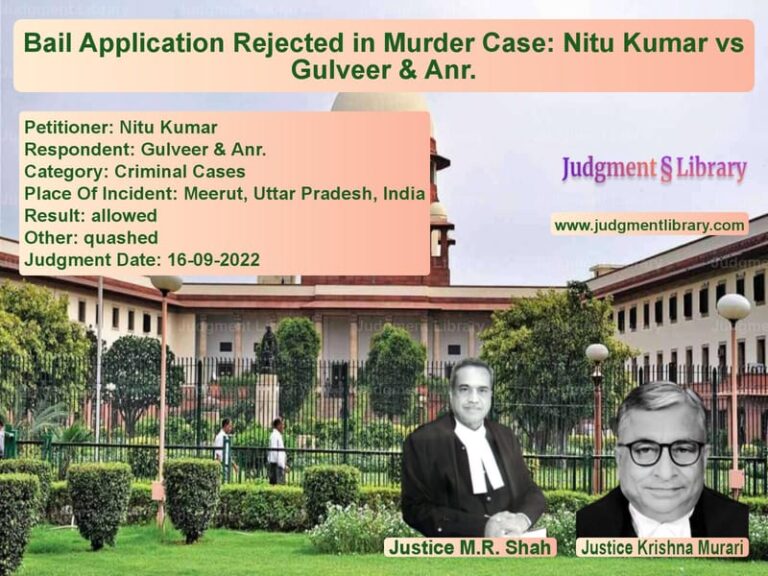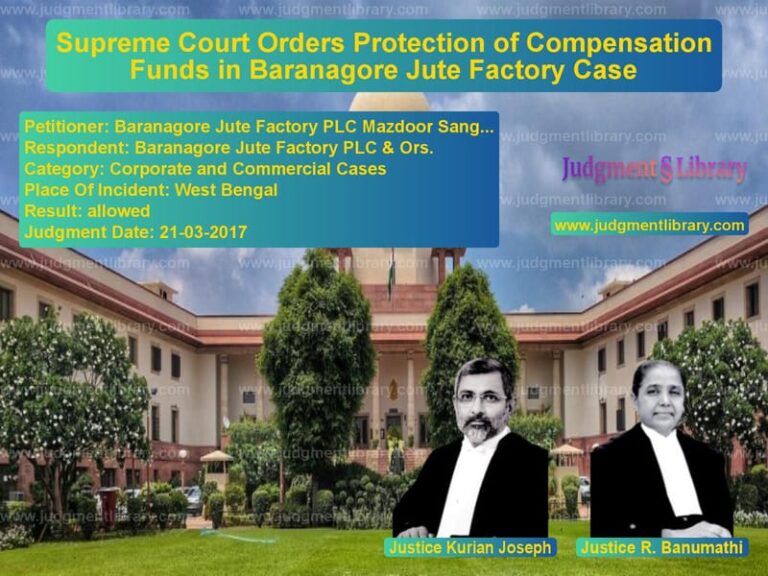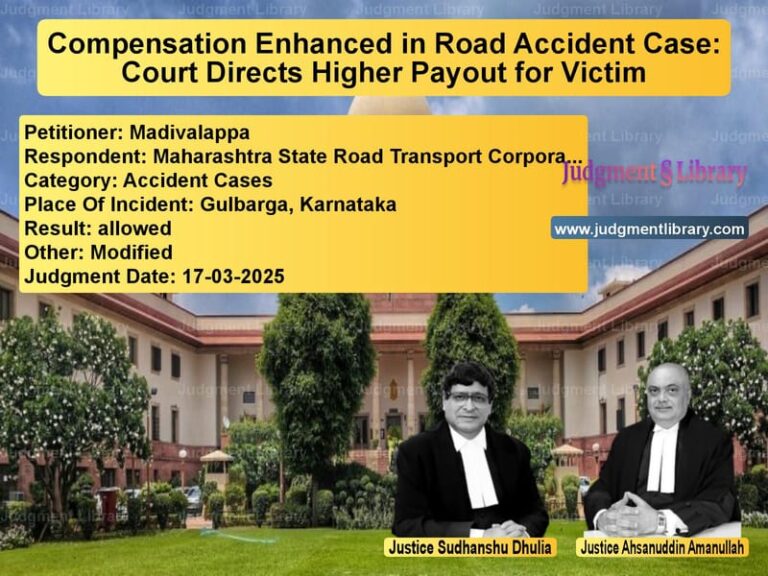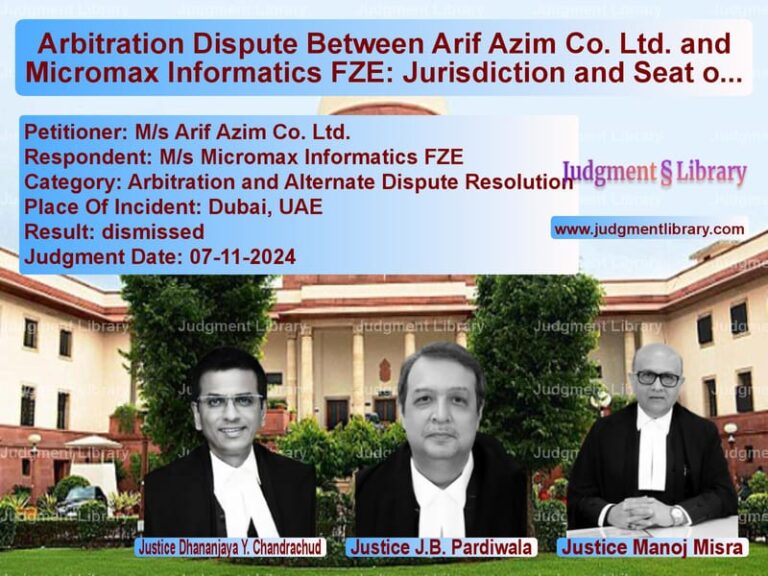Child Custody and Visitation Rights: Supreme Court’s Balanced Approach in Parental Disputes
The case of Ruhi Agrawal & Anr. vs. Nimish S. Agrawal brings to light a highly contested child custody battle where the paramount concern remains the welfare and best interests of the child. The dispute, which reached the Supreme Court, questioned the Chhattisgarh High Court’s decision to expand the visitation rights of the father beyond what was originally granted by the Family Court in Durg. The case highlights the complexities surrounding child custody, parental rights, and the need for a balanced approach that ensures the emotional, psychological, and physical well-being of the child involved.
Background of the Case
Ruhi Agrawal and Nimish S. Agrawal were married on January 16, 2007. From this marriage, their daughter was born on January 12, 2012. However, the couple’s marital discord led to their separation in 2016. Since then, the daughter had been residing with her mother, who assumed the role of the primary caregiver. The Family Court in Durg, upon reviewing the case, awarded sole custody of the child to the mother, with limited visitation rights to the father. These visitation rights were restricted to a brief, supervised meeting for one and a half hours on the first Sunday of every month and certain holidays.
Aggrieved by the minimal visitation rights granted to him, Nimish S. Agrawal appealed to the Chhattisgarh High Court, seeking either joint custody or an extension of visitation hours. The High Court, after examining the evidence and considering the welfare of the child, allowed the mother to retain sole custody but substantially expanded the father’s visitation rights. This decision was challenged by Ruhi Agrawal before the Supreme Court, citing concerns about her daughter’s safety, emotional stability, and the disruption of her daily routine.
Arguments Presented by Both Parties
Petitioner’s Arguments (Ruhi Agrawal & Anr.)
- The petitioner contended that the expanded visitation schedule imposed by the High Court was disruptive to the child’s education and extracurricular activities.
- She alleged that the respondent had a history of abusive behavior, including criminal charges, which posed a risk to the child’s safety.
- The petitioner expressed concerns that increased exposure to the respondent might lead to emotional distress for the child, given past incidents of conflict during visitations.
- She insisted on being present during visitations to ensure the child’s security and comfort.
Respondent’s Arguments (Nimish S. Agrawal)
- The respondent asserted that the expanded visitation arrangement was necessary to establish and maintain a meaningful relationship with his daughter.
- He accused the petitioner of manipulating the child’s perception of him, thereby hindering his ability to develop a bond with her.
- He argued that the presence of the petitioner during visitation sessions interfered with his ability to engage freely with his child.
- The respondent requested an interim arrangement that would allow him more opportunities to meet with his daughter and rebuild their strained relationship.
High Court’s Decision and Modifications to Visitation Rights
The Chhattisgarh High Court modified the visitation rights granted by the Family Court, expanding the father’s access to include:
- Extended visitation hours on alternate Saturdays.
- Allowing video calls every weekend for an hour, with additional brief interactions on weekdays.
- Permitting the child to spend a portion of long school vacations with her father.
- Granting the father an opportunity to celebrate specific festivals with the child for a limited time.
This decision was seen as an effort to balance the father’s right to be involved in his daughter’s life while maintaining the mother’s sole custodial rights.
Supreme Court’s Considerations and Interim Order
The Supreme Court, upon hearing both sides, took a cautious approach, recognizing the need for an arrangement that prioritizes the welfare of the child. The Court acknowledged the importance of maintaining a connection with both parents while ensuring the child’s emotional and physical security.
Key observations made by the Supreme Court included:
- Prolonged or overnight stays with the father were not permitted as the matter was still under review.
- Since allegations of abuse were raised, the Court found it inappropriate for the mother to be present during visitations but acknowledged her concerns regarding safety.
- A female court-appointed commissioner was mandated to oversee all in-person visitations to ensure the child’s well-being.
- Visitations were to be conducted in neutral public spaces rather than private locations.
The Supreme Court then issued an interim arrangement, modifying the High Court’s visitation order while the case was pending:
- Video calls between father and child would be permitted for one hour every Saturday and Sunday, with brief check-ins of 5-10 minutes on weekdays.
- Fortnightly in-person meetings at the Family Court, Durg, under the supervision of the female court commissioner.
- During long school vacations, the child could spend a limited time with her father, specifically from 9:00 AM to 9:00 PM on a single day.
- All visitations would be strictly supervised by the designated female court commissioner, ensuring the child’s safety and comfort.
Legal Principles Governing Custody and Visitation Rights
The Supreme Court’s ruling reinforces key legal principles surrounding child custody and visitation, including:
- The welfare of the child is the paramount consideration in custody disputes.
- While both parents have a right to be involved in their child’s life, visitation arrangements must not cause emotional distress or instability for the child.
- Supervised visitation may be warranted where safety concerns exist, ensuring the child’s best interests are upheld.
Conclusion
The Supreme Court’s approach in this case reflects the delicate balance courts must maintain in resolving custody disputes. By prioritizing the welfare and security of the child, while allowing the father reasonable visitation opportunities, the Court sought to ensure that both parents contribute meaningfully to the child’s upbringing. The case remains under review, with final determinations expected in due course.
As parental disputes continue to evolve, legal precedents such as this underscore the judiciary’s role in safeguarding the best interests of the child while addressing parental rights equitably.
Petitioner Name: Ruhi Agrawal.Respondent Name: Nimish S. Agrawal.Judgment By: Justice Vikram Nath, Justice Prasanna B. Varale.Place Of Incident: Durg, Chhattisgarh.Judgment Date: 22-01-2025.
Don’t miss out on the full details! Download the complete judgment in PDF format below and gain valuable insights instantly!
Download Judgment: ruhi-agrawal-vs-nimish-s.-agrawal-supreme-court-of-india-judgment-dated-22-01-2025.pdf
Directly Download Judgment: Directly download this Judgment
See all petitions in Child Custody
See all petitions in Alimony and Maintenance
See all petitions in Divorce by Desertion
See all petitions in Judgment by Vikram Nath
See all petitions in Judgment by Prasanna Bhalachandra Varale
See all petitions in partially allowed
See all petitions in Modified
See all petitions in supreme court of India judgments January 2025
See all petitions in 2025 judgments
See all posts in Divorce Cases Category
See all allowed petitions in Divorce Cases Category
See all Dismissed petitions in Divorce Cases Category
See all partially allowed petitions in Divorce Cases Category







